Grace Dieu
Tintern Abbey
Dore Abbey
Llantarnam Abbey





Saint Bernard and the Cistercians in Wales and Gwent, later 'Monmouthshire'
St. Stephen Harding, third Abbot of Cîteaux (1109-33), was an Englishman and his influence in the early organization of the Cistercian Order had been very great. It was natural therefore that, when, after the coming of St. Bernard and his companions in 1113, foundations began to multiply, the project of sending a colony of monks to England should find favourable consideration. Monks were also quickly sent to Wales. after a direct letter from St Bernard of Clairveaux.to Henry II. This was the same saintly St Bernard who had begged the pope to try and get soldiers to open up again the Holy Places of Jerusalem, sacred to pilgrimages, which Muslims had seized and who now denied access to Christians.This was the initial push for a Crusade-(or defence of the Cross)on behalf of the Church in occupied Jerusalem and Bethlehem.
Bernard of Clairvaux 1090-1153
Bernard was born in Burgundy of Tescelin, Lord of Fontaines and Aleth of Mombard)Both belonged to the highest nobility of Burgundy. Bernard was the third of a family of seven children, six of whom were sons, and a devout person had foretold his great destiny in the Church of Christ . So he was given a good education and raised with great care. This education was at Chatillon sur Seine. He loved literature and poetry, as can be seen in the beauty of his writing. Bossuet says ‘Piety is all’. He had a special devotion to the Blessed Virgin, the human Mother of God, and no one writes about her more sublimely about her.
When he was nineteen, his mother died.During his youth, he fought to keep his virtue, often heroically, but began to consider a life of prayer and contemplation.St Robert of Molesmes sent him to Citeaux where the Order of St Benedict was to be revived with all its vigour.Disciples flocked to the monastery and there were many vocations. Abbot Stephen was in charge, but although not 30, Bernard was listened to with respect by his brothers.On 23 December, Pope Calixtus II (who also had canonised St David)confirmed the Cistercian order by a Charter of Charity.This success at establishing the norms of the order was the influence of Bernard, who spoke about the primitive spirit of regularity and fervour which should be there in the monastic orders.Malachi, Metropolitan of the Church in Ireland visited Citeaux and a close connection grew up between the Irish and later the Welsh Churches, resulting in Bernard sending monks there .
Bernard saw one of his own students become pope as Eugenius III and sent him a booklet, in which he talks about the sanctity of the head and which contained one of the most beautiful pages on the papacy, treasured by all popes since. The latter part of Bernards life was saddened by the outcome of his Crusades to open up the Christian shrines in the holy land, which had been conquered by Muslim Turks, much of it because of shortcomings in discipline and holiness amongst political ffactions and the impossibility of waging a war so far from Western Europe. A compromise was reached by Richard II(The Lionheart) who came to an understanding with Sala’haddin to allow Christian pilgrims to return to the shrines in exchange of an end to hostilities.
Bernard died in 1153. He had founded 163 monasteries in different parts of Europe, and at the time of his death, they numbered 343! He was the first Cistercian monk placed in the calendar of Saints and canonised by Alexander III on 18th January 1174. Pope Pius VIII made him a ‘Doctor of the Church’.He cgave a wonderful and vibrant and holy activity to the Order.
Prayer of St Bernard, known to all Catholics
Memorare
Remember O most loving Virgin Mary, that never was it known that anyone who fled your protection, implored your help, or sought your intercession was left unaided. Inspired by this confidence I fly unto you, O virgin of Virgins, my mother. To you I come, before you I stand, sinful and sorrowful. O mother of the Word Incarnate, despise not my petitions, but in your mercy, hear and answer me.
Bernard wrote the beautiful words about Mary:
In dangers, in doubts, in difficulties, think of Mary, call upon Mary. Let not her name depart from your lips, never suffer it to reach your heart.
And that you may more surely obtain the assistance of her prayers, do not neglect to walk in her footsteps. With her for a guide, you shall never go astray;while invoking her, you shall never lose heart.
So long as she is in your mind, you are safe from deception; while she holds your hand you cannot fall; under her protection you have nothing to fear;if she walks before you, you shall not grow weary;if she shows you favour, you shall reach the goal.
Bernard writes of the Guardian Angels:
He has given you the protection of His angels! O wonderful gift and truly love of generosity! Who? For Whom? Why? What has He commanded?Let us study closely brothers, and let us industriously memorise this great Command.Who is it that commands? Whose angels are they?Whose Orders do they carry out? Whose Will do they obey? In answer:
‘He has given you his angels for safe keeping, to keep you strong in all thy ways and they will not hesitate even to lift you up in their hands’.
So He has given charge of you to His own angels. Think of it! To those sublime beings, who cling to Him so joyously and intimately, to His very own He has given charge over you! Who are you?What is man that Thou art mindful of him? Or the Son of man that thou visitest him? As if man were not rottenness, and a worm? Now why do you think, has He given them charge over thee?
With what reverence you should treat this Word! What devotion should you use to thank God? You should place great confidence in it. Reverence because of the presence of His angels around you, devotion because of their benevolence; confidence because of their care of you. Walk carefully in all you do, as one in which the angels can be present. He has given them charge. In every lodging,at every corner, have reverence for your angel. Do not dare to do in his presence what you would not dare to do in front of me. Or do you doubt that the angel is not present because you cannot see him? What if you should hear him.?
What if you should touch him? What if you should scent him? Remember that the presence of something is not proved only by the sight of things.
In this, therefore, brothers, let us affectionately love His angels as one day our future life in heaven is with them; meanwhile, however, as counsellors and defenders appointed by the Father and placed over us. Why should we fear such guardians? Those who keep us in all our ways can neither be overcome, nor be deceived,much less deceive. They are faithful. They are prudent.They are powerful.Why do we tremble? Let us only follow them and remain close to them and let us so abide in the protection of God in heaven. As often, therefore, as serious temptation is seen to bear down on you and a terrible trial is coming, call to your guard your leader, your helper in all your needs, in your time of trial; cry out to him and say with him, ‘Lord! Help and save us! We perish.’
The Cistercians in Wales-Some Foundations
Whitland Abbey 1140(Pembrokeshire) , Tintern 1141, Dore (founded from Morimund(1144) Strata Florida 1164, Llantarnam (near Cwmbran 1179) Grace Dieu(founded from Dore 1226 and also 1233) There are also other houses Valle Crucis in North Wales for example.
By 1143 three hundred monks had entered England, including the famous St. Ælred, known for his eloquence as the ‘St. Bernard of England.’
Whitland (in its early days called Albalanda) was founded in 1140 under the patronage of Bernard, bishop of St. Davids (1115-48). It was the first of four houses in Wales to be colonised directly from Clairvaux, and was destined to be the mother-house of most of the abbeys founded in the second half of the twelfth century in the central and northern parts of Wales.
The community of monks first arrived in West Wales in 1140 and by 1144 had settled at Little Trefgarn near Haverfordwest. Whitland took pride of place amongst the early Cistercian abbeys of south Wales and was from the first a house of the native Welsh in which members of the chief families took the habit and became abbots. Whitland must have attracted a significant number of new recruits for the abbey sent out three colonies of monks within thirty years of existence: Cwmhir (1143), Strata Florida (1164) and Strata Marcella (1170). A fifteenth-century report states that the abbey supported 100 monks and some servants at its foundation. In 1151 the monks at Little Trefgarn moved to a more suitable site at Whitland. There is now a rebuilt Abbey near the original site and the home of Cistercian nuns.
In Monmouthshire (Ancient Welsh Kingdom of Gwent)
There were four Cistercian Foundations in Gwent.
Tintern (9th May 1131 (oldest in Gwent)near Chepstow
Llantarnam (Feast of Mary Magdalene(July 22) in 1179),Cwmbran
Now in Herefordshire
Dore (1147 by French Monks from Morimond Abbey).Near Monmouth
Grace Dieu.( founded in 1226, destroyed in 1233-moved to a new site)
All were destroyed around 1536 by the henchmen of Henry VIII and graves and monuments desecrated.All have, however left substantial remains in the care of CADW. The influence of these monks was profound.Their care for the poor in their parishes and giving of dole, their work alongside their farmworkers and expertise in fields of farming and woodland helped the local communities. They were largely Welsh Nationalist, which caused them often to be attacked by the English but their granges and mills were to be found most of Monmouthshire.
Their story makes interesting reading and in the next weeks I shall be looking at their history and how Christians today are still worshipping at these sites and a resurgence of interest developing.Abbot Daniel van Sandvoort made a stirring sermon at Tintern in 2007 ('Living Stones'-can be found on You Tube) Grace Dieu Abbey had been destroyed and burned down by the Welsh several times before the ‘Reformation’and moved sites and there is some uncertainty of where it came to rest. It was, one of the poorest Cistercian houses in Wales and did not make much money for Henry VIII when it was seized.
I will go on in the next posts to look at the places where St Bernard made his contributions to the life of Monmouthshire. Wonderful writer.











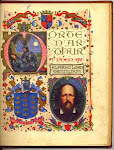







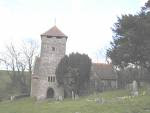
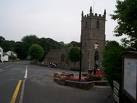


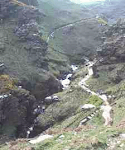

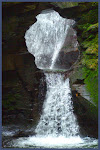


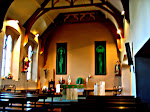









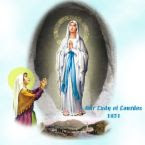


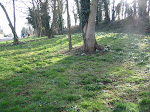

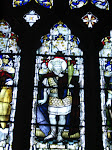
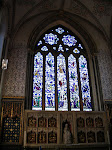
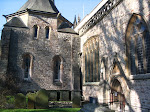
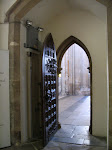
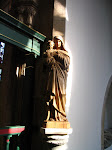


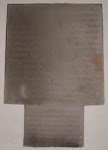



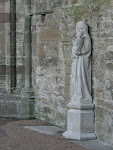









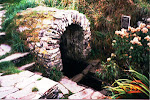


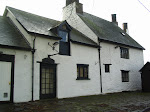
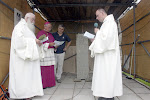



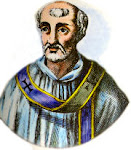
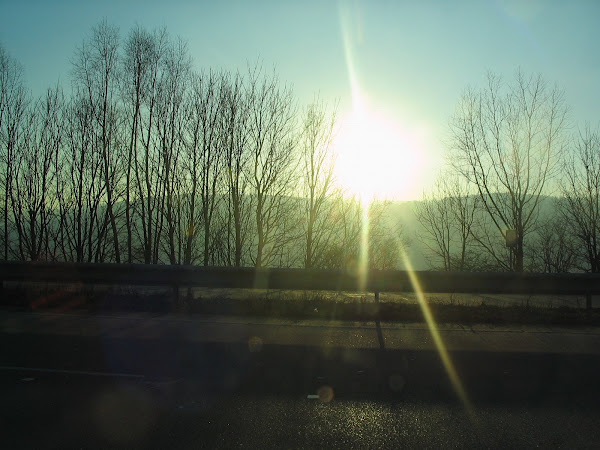


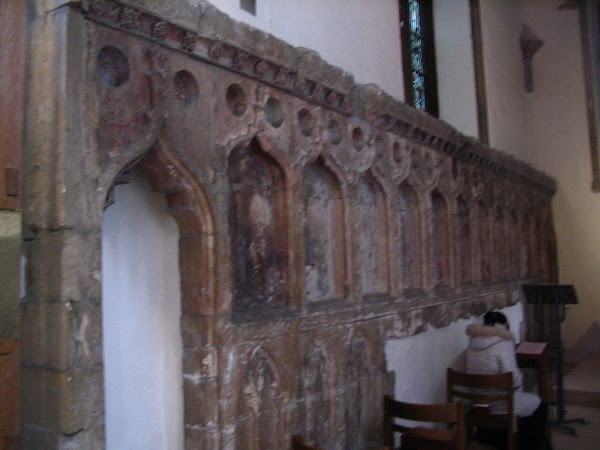
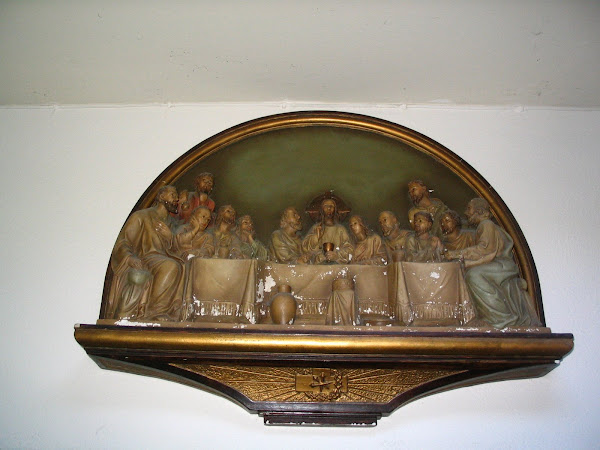




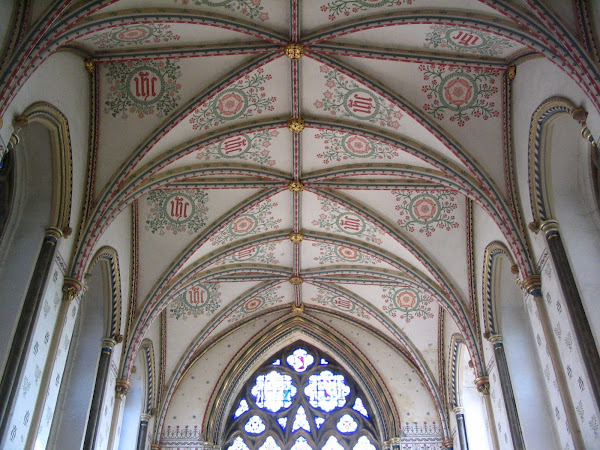


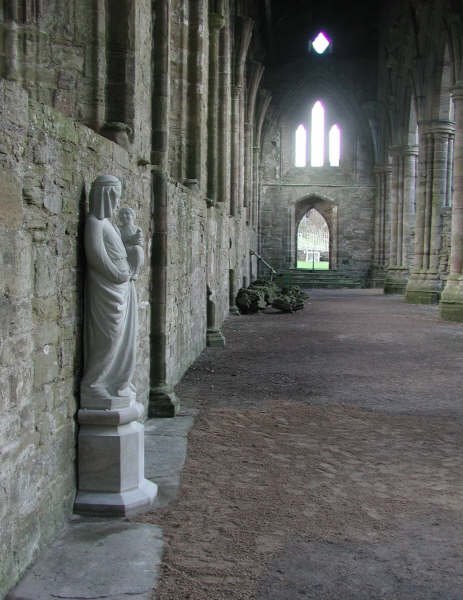
4 comments:
In reply to Anonymous: The Catholic Church does not teach that Mary takes the place of Jesus or God so you have made a mistake.It is a common misconception. Jesus is GOD, who walked on the earth and who founded a church on the rock of Peter and the Apostles. Three hundred and fifty years later, the church compiled the Bible we all use today, except Martin Luther took out seven books, which our Lord himself referred to , as they did not fit in his new Protestant teachings.
The honour we give to Mary is biblical but not given by many rather ungrateful Christians.Mary was a human being, not God, but SINGLED OUT by God for a great task, to give himself to man in a human form.
We follow God and the Angel Gabriel who calls her FULL OF GRACE
BLESSED ARE THOU AMONGST WOMEN Gabriel IN THE WORDS OF GOD calls her BLESSED. Some people do not give her this respect.We do and are so thankful for her 'let it be done to me ACCORDING TO THY WORD'.Her choice was to be OBEDIENT TO THE WILL OF GOD.
Also Luke 2, the visit to Elizabeth who is overawed.
'Who am I that the MOTHER OF MY LORD should visit me?'
For Mary was the Mother of the Second person of the TRINITY.-Jesus as GOD.
Is that a special honour to confer upon a human being or was it not. Can we give her less honour than God?
'BLESSED BE THE FRUIT OF THY WOMB;.
If Elizabeth blessed her, we also do so.
Mary herself:
; for he hath regarded the lowliness of his handmaiden
For behold, from henceforth
ALL GENERATIONS SHALL CALL ME BLESSED
And so we do-call her blessed.
The Honour due to the Lord God and Our Lord Jesus Christ and the Holy Spirit, is that due to their DIVINITY.This is GOD. Mary was a GIRL-a HUMAN.
Mary was a simple girl who took on an awesome task, aware of what this would mean.She did not understand even the words:
HOW CAN THIS BE,SINCE I KNOW NOT A MAN? (St Luke 1)
The angel tells her that the Holy Spirit will come upon her.
Clearly God SINGLED OUT this lowly and poor village girl for his Plan of Salvation, he loved hyman beings so much as to come down to this world in the Womb of this girl.
Mary is the most perfect Christian.She could have been stoned to death for agreeing to God's command, but did not hesitate.
Her trust in God and courage in the faith was unmistakeable and heroically virtuous.
At the foot of the Cross, he gave his beloved grieving and suffering Mother to St John and hence the church he had established with his apostles, and St John and the Apostles received her as his mother.
She is the first among the human saints, and we love this human woman because of what she did for us. The Church is the Body of Christ in the WORLD.He has no hands but ours. The Blessed Mother his has given us is to be respected and honoured and her trust in God emulated and copied as a role model for us in the World. We love her as HE did.
We are not into marginalising her or 'dissing 'her as some sort of reproduction vessel.God honoured her greatly. Martin Luther even had a healthy love for the Blessed Mother, who is for all the year-not just for Christmas.
When we simply echo the words of the angel
Hail Mary, FULL of GRACE, THE LORD IS WITH THEE, BLESSED ART THOU AMONG WOMEN.
We will give her no less honour than God and the Archangel Gabriel.
Because God really does LOVE the WORLD AND THOSE OF US IN IT HE CREATED.Mary is a worthy example of Faith, and is an ikon of the Church. If St Bernard reflects and muses on her whole life of dedication to God, he is only doing what Christians did from the very beginning.Some people are more effusive than others, especially in some coountries, but all of us honour her.
You should also be aware, that to PRAY means to ASK in Old English.Because St Paul has told us that nothing can separate us from the Love of God,not death itself, we ask Mary or a saint departed for extra prayers.
PRAYER is not neccessarily 'worship'.That is for God alone.
In reply to Anonymous: The Catholic Church does not teach that Mary takes the place of Jesus or God so you have made a mistake.It is a common misconception. Jesus is GOD, who walked on the earth and who founded a church on the rock of Peter and the Apostles. Three hundred and fifty years later, the church compiled the Bible we all use today, except Martin Luther took out seven books, which our Lord himself referred to , as they did not fit in his new Protestant teachings.
The honour we give to Mary is biblical but not given by many rather ungrateful Christians.Mary was a human being, not God, but SINGLED OUT by God for a great task, to give himself to man in a human form.
We follow God and the Angel Gabriel who calls her FULL OF GRACE
BLESSED ARE THOU AMONGST WOMEN Gabriel IN THE WORDS OF GOD calls her BLESSED. Some people do not give her this respect.We do and are so thankful for her 'let it be done to me ACCORDING TO THY WORD'.Her choice was to be OBEDIENT TO THE WILL OF GOD.
Also Luke 2, the visit to Elizabeth who is overawed.
'Who am I that the MOTHER OF MY LORD should visit me?'
For Mary was the Mother of the Second person of the TRINITY.-Jesus as GOD.
Is that a special honour to confer upon a human being or was it not. Can we give her less honour than God?
'BLESSED BE THE FRUIT OF THY WOMB;.
If Elizabeth blessed her, we also do so.
Mary herself:
; for he hath regarded the lowliness of his handmaiden
For behold, from henceforth
ALL GENERATIONS SHALL CALL ME BLESSED
And so we do-call her blessed.
The Honour due to the Lord God and Our Lord Jesus Christ and the Holy Spirit, is that due to their DIVINITY.This is GOD. Mary was a GIRL-a HUMAN.
Mary was a simple girl who took on an awesome task, aware of what this would mean.She did not understand even the words:
HOW CAN THIS BE,SINCE I KNOW NOT A MAN? (St Luke 1)
The angel tells her that the Holy Spirit will come upon her.
Clearly God SINGLED OUT this lowly and poor village girl for his Plan of Salvation, he loved hyman beings so much as to come down to this world in the Womb of this girl.
Mary is the most perfect Christian.She could have been stoned to death for agreeing to God's command, but did not hesitate.
Her trust in God and courage in the faith was unmistakeable and heroically virtuous.
At the foot of the Cross, he gave his beloved grieving and suffering Mother to St John and hence the church he had established with his apostles, and St John and the Apostles received her as his mother.
She is the first among the human saints, and we love this human woman because of what she did for us. The Church is the Body of Christ in the WORLD.He has no hands but ours. The Blessed Mother his has given us is to be respected and honoured and her trust in God emulated and copied as a role model for us in the World. We love her as HE did.
We are not into marginalising her or 'dissing 'her as some sort of reproduction vessel.God honoured her greatly. Martin Luther even had a healthy love for the Blessed Mother, who is for all the year-not just for Christmas.
When we simply echo the words of the angel
Hail Mary, FULL of GRACE, THE LORD IS WITH THEE, BLESSED ART THOU AMONG WOMEN.
We will give her no less honour than God and the Archangel Gabriel.
Because God really does LOVE the WORLD AND THOSE OF US IN IT HE CREATED.Mary is a worthy example of Faith, and is an ikon of the Church. If St Bernard reflects and muses on her whole life of dedication to God, he is only doing what Christians did from the very beginning.Some people are more effusive than others, especially in some coountries, but all of us honour her.
You should also be aware, that to PRAY means to ASK in Old English.Because St Paul has told us that nothing can separate us from the Love of God,not death itself, we ask Mary or a saint departed for extra prayers.
PRAYER is not neccessarily 'worship'.That is for God alone.
To Tammy: That is because , if a loved one was in hospital undergoing a serious operation you would beg all your most powerful praying friends fo pray for them as well as you.
In the Catholic church we believe in the resurrection and that the Righteous ones live in heaven with God as Jesus promised to his Faithful.Early Christians (and you can check this by reading the writings of St Ignatius Bishop of Antioch who was eaten by lions for example, believed the Faithful live with God. They have ETERNAL LIFE with him. Check out Revelations 8 verse 3 which gives the idea. That Mary was not just a vessel for God to come to earth is plain, in Revelations Chapter 12.
This is the ancient teaching of the Church and why respect and honour is due to Mary. She lives with God, like all our saints-incuding the precious martyred brothers and sisters of Iraq last week and the blessed Fathers who died on the altar. They live with God. The WHOLE CHURCH which is the BODY OF CHRIST prays together for the Kingdom. The Lords Prayer is very precious to us, and stands at the highest point in the Mass, and is something we repeat every day in our prayers. We really do believe they are not dead, but live with Christ in the Trinity.
Your belief that they are dead is disturbing because it seems to deny the resurrection. We do not pray to Mary in the sense of 'worship' we ASK for the assistance of her prayers as we would to a living saint in times of adversity. How can we not love her, whom her precious Saviour Son loved so much.
She made him aware of the needs of the people at Cana 'They have no wine'-why should she not go on doing this? Our church is here and now in the world-not historical and simply all dead and gone.
Jesus' admonistion to pray the Our Father came in the context of the elaborate prayers of the Jews. If you would, in intellectual honesty like to know more about the Lords Prayer, look it up in the Catechism of the Catholic Church and see if there is anything in there to disagree with. I think you will be surprised. Problem is that many just keep looking at their faith through their own traditions, Steve Ray called his 'baptist glasses' and were surprised by the truth.Keep knocking the door of truth and you will find it. Christ lives and with him all those to whom he has promised new life.
Post a Comment